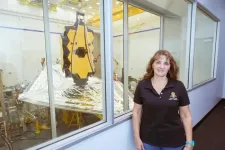(Press-News.org) In recent years, physicians and scientists in parts of Brazil where visceral leishmaniasis (VL) is endemic have seen rising numbers of cases of co-infection by Leishmania infantum and Crithidia, also a protozoan but hitherto believed to be a mosquito parasite that cannot infect humans or other mammals. Accurate diagnosis is hindered by a lack of simple specific tests (more at: https://agencia.fapesp.br/42072 and https://agencia.fapesp.br/31581).
To accelerate and facilitate detection of the pathogens involved, supporting appropriate decisions regarding treatment, researchers at the Federal University of São Carlos (UFSCar) have developed a PCR test which analyzes the genetic material in the sample and produces a result in less than two hours. An article on the study was published in the journal Tropical Medicine and Infectious Disease.
Leishmaniasis is a neglected disease and is considered a global public health problem. Brazil reports more than 3,500 cases per year, according to the Health Ministry, or 93% of all cases in Latin America. The disease caused 165 deaths in Brazil in 2020.
VL is the most severe form of the disease, affecting the spleen, liver, bone marrow and lymph nodes, and can be lethal if it is not correctly treated or is misdiagnosed. The main agent of VL is L. infantum.
The study was funded by FAPESP via nine projects (16/18527-3, 16/20258-0, 17/16328-6, 18/26799-9, 19/19789-0, 20/14011-8, 20/15771-6, 21/10358-6 and 21/12464-8).
The novel method is an advance on the usual diagnostic technique. In the study, it was highly accurate in identifying and quantifying L. infantum and Crithidia in samples obtained in vitro or collected from human hosts as well as dogs, cats and insects by means of skin biopsies or bone marrow aspiration.
“Although there are other molecular methods for identifying species, they require DNA sequencing of the sample, which is laborious, slow and expensive. Our test analyzes the parasite’s genetic material directly from vectors and human or animal tissue,” said Sandra Regina Costa Maruyama, last author of the article and a professor of evolutionary genetics and molecular biology at UFSCar.
Unlike the quick tests used by health clinics and pharmacies, which do not detect pathogens directly but identify the relevant antibodies, the researchers designed their dye-based quantitative PCR assay on the basis of targeted sequences from L. infantum and Crithidia in experimental and clinical samples. A test had to be performed first to detect the former parasite, followed by another to identify the latter.
“The targets resulted from our analysis of the two species’ genomes. Our most recent study showed specificity in different sample types. The test can now be optimized to show in a single reaction whether the infection was caused by L. infantum, Crithidia or both,” Maruyama said.
The test can be performed by any diagnostic laboratory capable of performing qPCR tests (now more widespread following the COVID-19 pandemic). It can also be used in epidemiological research, parasite load monitoring, and treatment follow-up.
Co-infection cases
The study involved analysis of 62 parasites isolated from VL patients’ tissues, with 51 testing positive for Crithidia. In addition, bone marrow co-infection by Crithidia and L. infantum was identified in two new cases of VL in Brazil. In May the group published an article on a case of severe VL in which both species were detected.
According to Maruyama, beyond the efficacy of the test, the results show that infection by Crithidia is more frequent than has hitherto been supposed, and that co-infection by both protozoans appears to occur above all in the most severe cases.
“We don’t yet understand the clinical implications of the presence of Crithidia in cases of VL, but we suspect that co-infection exacerbates the disease or prevents patients from responding to the recommended treatment for L. infantum,” she said. “Identifying the species of parasite correctly ensures that appropriate measures can be taken quickly to prevent progression of the patient’s clinical condition, potentially reducing mortality. It also points to the possible development of more specific drugs and treatments in future.”
About São Paulo Research Foundation (FAPESP)
The São Paulo Research Foundation (FAPESP) is a public institution with the mission of supporting scientific research in all fields of knowledge by awarding scholarships, fellowships and grants to investigators linked with higher education and research institutions in the State of São Paulo, Brazil. FAPESP is aware that the very best research can only be done by working with the best researchers internationally. Therefore, it has established partnerships with funding agencies, higher education, private companies, and research organizations in other countries known for the quality of their research and has been encouraging scientists funded by its grants to further develop their international collaboration. You can learn more about FAPESP at www.fapesp.br/en and visit FAPESP news agency at www.agencia.fapesp.br/en to keep updated with the latest scientific breakthroughs FAPESP helps achieve through its many programs, awards and research centers. You may also subscribe to FAPESP news agency at http://agencia.fapesp.br/subscribe.
END
Test detects co-infection by novel species of parasite in severe cases of visceral leishmaniasis
The test developed by Brazilian researchers accurately identifies the causative agent in less than two hours, so that treatment can be properly targeted.
2023-11-01
ELSE PRESS RELEASES FROM THIS DATE:
Dr. Zainab Mahmoud to receive the 2023 Dr. Nanette K. Wenger Research Goes Red® Award
2023-11-01
DALLAS, Nov. 1, 2023 – The American Heart Association will present the 2023 Dr. Nanette K. Wenger Research Goes Red® Award to Zainab Mahmoud, M.D., M.Sc., of Washington University School of Medicine in St. Louis. This award will be presented during the opening session of the Association’s Scientific Sessions 2023 on Saturday, Nov. 11. The meeting, to be held in Philadelphia, Saturday, Nov. 11 through Monday, Nov. 13, is a premier global exchange of the latest scientific advancements, ...
Lepore chosen to lead Public Policy & Aging Report
2023-11-01
The Gerontological Society of America (GSA) — the nation’s largest interdisciplinary organization devoted to the field of aging — has named Michael Lepore, PhD, of the University of Massachusetts (UMass) Amherst as the next editor-in-chief of the journal Public Policy & Aging Report, effective January 2024.
“I am honored to serve as editor-in-chief of Public Policy & Aging Report, which for nearly 30 years has provided non-partisan analyses of aging-related policy issues,” Lepore said. “This venerable journal has been a mainstay of my training and professional ...
Dr. Mary McGrae McDermott to be awarded the 2023 Clinical Research Prize
2023-11-01
DALLAS, Nov. 1, 2023 — The American Heart Association will present the 2023 Clinical Research Prize to Mary McGrae McDermott, M.D., FAHA, of Northwestern University’s Feinberg School of Medicine in Chicago. The Clinical Research Prize is awarded annually to physicians or scientists who are advancing clinical science in support of the Association’s mission.
Dr. McDermott has dedicated her career to advancing medical knowledge of peripheral artery disease (PAD). She will be recognized during the presidential session on Sunday, Nov. 12, 2023 at the Association’s Scientific Sessions ...
Dr. Olugbenga Ogedegbe to receive the 2023 Population Health Research Prize
2023-11-01
DALLAS, Nov. 1, 2023 — The American Heart Association will present its 2023 Population Health Research Prize to Olugbenga “Gbenga” Ogedegbe, M.D., M.P.H., FAHA, of New York University’s Grossman School of Medicine. He will be recognized during the presidential session of the Association’s Scientific Sessions 2023 on Sunday, Nov. 12. The meeting will be held in Philadelphia, Saturday, Nov. 11 through Monday, Nov. 13 and is a premier global exchange of the latest scientific advancements, research and evidence-based clinical practice updates in cardiovascular science.
Dr. ...
Dr. Marc A. Pfeffer to be receive the 2023 Eugene Braunwald Academic Mentorship Award
2023-11-01
DALLAS, Nov. 1, 2023 — The American Heart Association will present its 2023 Eugene Braunwald Academic Mentorship Award to Marc A. Pfeffer, M.D., Ph.D., FAHA, of Harvard Medical School and Brigham and Women’s Hospital. The Eugene Braunwald Academic Mentorship Award will be recognized during the Presidential Session on Sunday, Nov. 12, 2023, at the Association’s Scientific Sessions 2023. The meeting, to be held in Philadelphia, Saturday, Nov. 11 through Monday, Nov. 13, is a premier global exchange of the latest scientific advancements, research and evidence-based clinical practice updates in cardiovascular science.
The Eugene Braunwald Academic ...
What happens when cats get fat? Scientists weigh in
2023-11-01
URBANA, Ill. – Cat owners want Kitty to be happy, but providing an abundance of food and snacks can have unintended consequences. Feline obesity is on the rise, impacting the health, longevity, and wellbeing of cats. A new study from the University of Illinois Urbana-Champaign looks at what happens in the digestive system and gut microbiota when cats eat too much.
“About 60% of cats in the U.S. are overweight, which can lead to health problems such as diabetes and chronic inflammation. While many studies have investigated feline weight loss, there has been little focus on the opposite process, ...
Dr. Marlene Rabinovitch to receive the 2023 Research Achievement Award
2023-11-01
DALLAS, Nov. 1, 2023 – The American Heart Association will present its 2023 Research Achievement Award to Marlene Rabinovitch, M.D., of Stanford University. The Research Achievement Award will be recognized during the Presidential Session on Sunday, Nov. 12, 2023, at the Association’s Scientific Sessions 2023. The meeting, to be held in Philadelphia, Saturday, Nov. 11 through Monday, Nov. 13, is a premier global exchange of the latest scientific advancements, research and evidence-based clinical practice updates in cardiovascular science.
Throughout her nearly 40-year career as a physician scientist, Dr. Rabinovitch’s research ...
Dr. Yibin Wang of Duke-NUS to receive the 2023 Basic Research Prize
2023-11-01
DALLAS, Nov. 1, 2023 — The American Heart Association will present its 2023 Basic Research Prize to Yibin Wang, Ph.D., FAHA, of Duke-NUS Medical School in Singapore and Duke University School of Medicine, Durham, NC. He will be recognized during the Presidential Session of the Association’s Scientific Sessions 2023 on Sunday, Nov. 12. The meeting, to be held in Philadelphia, Saturday, Nov. 11 through Monday, Nov. 13, is a premier global exchange of the latest scientific advancements, research and evidence-based clinical practice updates in cardiovascular science.
Dr. ...
NASA’s Sandra Irish wins 2023 Society of Women Engineers Award
2023-11-01
Sandra Irish, mechanical systems lead structures engineer for NASA’s James Webb Space Telescope, has been selected to receive the Society of Women Engineers (SWE) Resnik Challenger Medal Award for her visionary contributions to the development, testing, transport, and launch of NASA’s premier space telescope since 2006. The medal was awarded during the World’s Largest Conference for Women in Engineering and Technology or WE23, which took place Oct. 26-28 in Los Angeles.
As an engineer at NASA’s Goddard Space Flight Center in Greenbelt, Maryland, for over 40 years, Irish’s mechanical systems expertise has helped ...
From soft tissue to stiff leather: Understanding the role of paxillin in liver fibrosis
2023-11-01
Currently, the United States lacks FDA-approved treatments for liver fibrosis, highlighting the critical need to understand the cellular biology and pathways associated with this condition.
In a recent study led by Don Rockey, M.D., the director of the Digestive Disease Research Core Center, and Nour Hijazi, an M.D.-Ph.D. student at the Medical University of South Carolina, significant progress has been made in understanding a pathway contributing to liver fibrosis. Their findings, highlighting a potential novel therapeutic ...
LAST 30 PRESS RELEASES:
Kidney cancer study finds belzutifan plus pembrolizumab post-surgery helps patients at high risk for relapse stay cancer-free longer
Alkali cation effects in electrochemical carbon dioxide reduction
Test platforms for charging wireless cars now fit on a bench
$3 million NIH grant funds national study of Medicare Advantage’s benefit expansion into social supports
Amplified Sciences achieves CAP accreditation for cutting-edge diagnostic lab
Fred Hutch announces 12 recipients of the annual Harold M. Weintraub Graduate Student Award
Native forest litter helps rebuild soil life in post-mining landscapes
Mountain soils in arid regions may emit more greenhouse gas as climate shifts, new study finds
Pairing biochar with other soil amendments could unlock stronger gains in soil health
Why do we get a skip in our step when we’re happy? Thank dopamine
UC Irvine scientists uncover cellular mechanism behind muscle repair
Platform to map living brain noninvasively takes next big step
Stress-testing the Cascadia Subduction Zone reveals variability that could impact how earthquakes spread
We may be underestimating the true carbon cost of northern wildfires
Blood test predicts which bladder cancer patients may safely skip surgery
Kennesaw State's Vijay Anand honored as National Academy of Inventors Senior Member
Recovery from whaling reveals the role of age in Humpback reproduction
Can the canny tick help prevent disease like MS and cancer?
Newcomer children show lower rates of emergency department use for non‑urgent conditions, study finds
Cognitive and neuropsychiatric function in former American football players
From trash to climate tech: rubber gloves find new life as carbon capturers materials
A step towards needed treatments for hantaviruses in new molecular map
Boys are more motivated, while girls are more compassionate?
Study identifies opposing roles for IL6 and IL6R in long-term mortality
AI accurately spots medical disorder from privacy-conscious hand images
Transient Pauli blocking for broadband ultrafast optical switching
Political polarization can spur CO2 emissions, stymie climate action
Researchers develop new strategy for improving inverted perovskite solar cells
Yes! The role of YAP and CTGF as potential therapeutic targets for preventing severe liver disease
Pancreatic cancer may begin hiding from the immune system earlier than we thought
[Press-News.org] Test detects co-infection by novel species of parasite in severe cases of visceral leishmaniasisThe test developed by Brazilian researchers accurately identifies the causative agent in less than two hours, so that treatment can be properly targeted.


